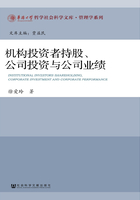
Abstract
Institutional investors, which have become the dominant force of the global capital markets, particularly the mature capital markets, developing in the context of the financial globalization, welfare reform and other factors. However, as a new invest-subject in the markets, the institutional investors have changed significantly the global financial system in the last 30 years. Currently, institutional investors exert important influence on the stability of the financial market and the efficiency of the resource allocation. Moreover, from the micro-level, in-stitutional investors have significant and far-reaching impact on corporate governance. The purpose of corporate governance is to ensure the science of the corporate decision-making and the investment decision-making, as one of the most important financial decision-making, is the main motivation of the growth of the company and an important foundation for the growth of the future cash flow. Therefore, this book aims to study the relationship between the institutional investors and the investment-decisions of the companies and its economic consequences, and to try to provide evidence for the development of institutional investors and for the investment decision-making of the companies.
This book is divided into eight parts by chapter structure:
Chapter I(Introduction)mainly introduces the research background and significance, the research ideas and methods, and the main contributions, etc.
Chapter II(Literature Review)reviews the relevant literature related to the institutional investor initiative and heterogeneity, institutional investor share-holding and corporate investments, institutional investor shareholding and corpo-rate performance.
Chapter III(Institutional Background), firstly, on the basis of defining the institutional investors of our country, reviews the development course, the present situation and the internal restraints of the institutional investors in China. Secondly, it analyzes the external environment of the institutional investors' existence and development, including the market environment, the legal system and the corporate governance.
Chapter IV(Theoretical Basis and Mechanism Analysis), combing the agency theory, the information asymmetry theory, the integration of corporate governance and corporate investment theory, the stakeholder theory, analyzes the motivation and the methods in which institutional investors play a role in corporate governance, and expounds the possible role of institutional investor in the company's investment expenditure and its mechanism.
ChapterV(Institutional Investors Shareholding and Corporate Investment:Analysis of Shareholding Preference), using the date of capital market and public source, combined with the relevant theoretical expectations, puts forward a number of hypotheses to examine whether institutional investors have a prefer-ence for holdings in terms of the characteristics of listed companies(growth, profitability, dividend policy, firm size, financial risk), the market perform-ance(listing time, risk and growth opportunities, stock transaction costs, stock market returns), the corporate governance(accounting information quality, equity concentration, board characteristics)and so on.
Chapter VI(Institutional Investors Shareholding and Corporate Invest-ment: Analysis of Effect of Corporate Governance), combined with the rele-vant theoretical expectations, the macro-economic background and the inter-nal micro-governance results of our country's state-owned enterprises, puts forward a number of hypotheses to examine, firstly, whether institutional in-vestors shareholding has an impact on the scale of the investment expenditure of listed company, and secondly, whether institutional investors have an inhibitory effect on the inefficient investment of listed company. Specially, it examined the impact of institutional investors shareholding from both underinvestment and overinvestment.
Chapter VII(Institutional Investors Shareholding, Corporate Investment and Corporate Performance: Analysis of Economic Effects), on the basis of relevant theoretical analysis, puts forward a number of hypotheses to examine whether the influence of institutional investors on investment expenditure will bring about the improvement of enterprise value.
Chapter VIII(Epilogue)summarizes the conclusions, the implications and the limitations of this book, and the future research.
The main conclusions of this book are as follows: 1. China's institutional investors have certain information superiority. They can identify the stock with investment value through the analysis relevant information of listed companies.2. China's institutional investors have played a certain governance role in the investment expenditure of invested companies.3. From the perspective of corporate performance, China's institutional investors have played a positive role. This positive role promoted indirectly the improvement of company's performance through its impact on the investment expenditure.4. Institutional investors are heterogeneous. Found holdings are the dominant institutional categories of institutional investors.
Key Words: Institutional investors; Investment decision-making; Inefficient investment